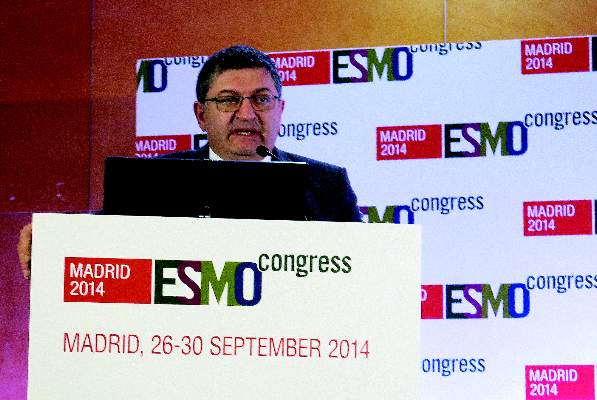User login
MADRID – The investigational neurokinin-1 receptor antagonist rolapitant met all of its endpoints in the prevention of chemotherapy-induced nausea and vomiting in a phase III trial.
Among 532 patients receiving cisplatin chemotherapy, 72.7% randomized to oral rolapitant versus 58.4% on placebo achieved the primary endpoint of complete response, defined as no emesis or use of rescue medication, in the delayed phase of more than 24 hours to 120 hours following chemotherapy (P less than .001).
Complete responses also were higher with rolapitant in the acute phase (0-24 hours) post chemotherapy (83.7% vs. 73.7%; P = .005) and the overall phase (0-120 hours) post chemotherapy (70.1% vs. 56.5%; P = .001), according to a late-breaking abstract reported at the European Society for Medical Oncology Congress.
Rolapitant works by blocking activation of neurokinin (NK)-1 receptors concentrated in the brain, which play a central role in nausea and vomiting.
Rolapitant is unique in that it has an extremely long half-life of 180 hours and NK-1 receptor occupancy of more than 90% for up to 5 days, study coauthor Dr. Bernardo Rapoport of the Medical Oncology Centre of Rosebank, Johannesburg, South Africa, explained during a press briefing on the study.
Kaplan-Meier analysis suggests that the effect of rolapitant begins in the acute phase, with separation of the curves beginning at about 12 hours.
More than 85% of cancer patients not treated appropriately can be affected by chemotherapy-induced nausea and vomiting, Dr. Rapoport said, adding that active management of this “most feared” side effect can improve quality of life and compliance with cancer treatment.
There was a slight improvement in quality of life in the rolapitant arm versus controls, as measured by the Functional Living Index-Emesis questionnaire (mean total score 112.5 vs. 108.4; P = .032).
Patients in the study were evenly randomized on the day of chemotherapy to oral rolapitant 200 mg or placebo, plus intravenous granisetron and oral dexamethasone.
Treatment-related adverse events were consistent across both arms, with most considered related to chemotherapy or the underlying cancer, Dr. Rapoport said.
Rolapitant is being developed by Tesaro in oral and intravenous formulations. A new drug application was filed in September 2014 with the U.S. Food and Drug Administration for oral rolapitant based on results from four controlled trials.
Rolapitant will face stiff competition in the market from Merck’s long-standing NK1 receptor antagonist, aprepitant (Emend), which is approved for prevention of chemotherapy-induced nausea and vomiting in combination with a corticosteroid and a 5-HT₃ antagonist. Rolapitant failed to meet a key secondary endpoint in a phase III trial last year, sending Tesaro stocks tumbling.
MADRID – The investigational neurokinin-1 receptor antagonist rolapitant met all of its endpoints in the prevention of chemotherapy-induced nausea and vomiting in a phase III trial.
Among 532 patients receiving cisplatin chemotherapy, 72.7% randomized to oral rolapitant versus 58.4% on placebo achieved the primary endpoint of complete response, defined as no emesis or use of rescue medication, in the delayed phase of more than 24 hours to 120 hours following chemotherapy (P less than .001).
Complete responses also were higher with rolapitant in the acute phase (0-24 hours) post chemotherapy (83.7% vs. 73.7%; P = .005) and the overall phase (0-120 hours) post chemotherapy (70.1% vs. 56.5%; P = .001), according to a late-breaking abstract reported at the European Society for Medical Oncology Congress.
Rolapitant works by blocking activation of neurokinin (NK)-1 receptors concentrated in the brain, which play a central role in nausea and vomiting.
Rolapitant is unique in that it has an extremely long half-life of 180 hours and NK-1 receptor occupancy of more than 90% for up to 5 days, study coauthor Dr. Bernardo Rapoport of the Medical Oncology Centre of Rosebank, Johannesburg, South Africa, explained during a press briefing on the study.
Kaplan-Meier analysis suggests that the effect of rolapitant begins in the acute phase, with separation of the curves beginning at about 12 hours.
More than 85% of cancer patients not treated appropriately can be affected by chemotherapy-induced nausea and vomiting, Dr. Rapoport said, adding that active management of this “most feared” side effect can improve quality of life and compliance with cancer treatment.
There was a slight improvement in quality of life in the rolapitant arm versus controls, as measured by the Functional Living Index-Emesis questionnaire (mean total score 112.5 vs. 108.4; P = .032).
Patients in the study were evenly randomized on the day of chemotherapy to oral rolapitant 200 mg or placebo, plus intravenous granisetron and oral dexamethasone.
Treatment-related adverse events were consistent across both arms, with most considered related to chemotherapy or the underlying cancer, Dr. Rapoport said.
Rolapitant is being developed by Tesaro in oral and intravenous formulations. A new drug application was filed in September 2014 with the U.S. Food and Drug Administration for oral rolapitant based on results from four controlled trials.
Rolapitant will face stiff competition in the market from Merck’s long-standing NK1 receptor antagonist, aprepitant (Emend), which is approved for prevention of chemotherapy-induced nausea and vomiting in combination with a corticosteroid and a 5-HT₃ antagonist. Rolapitant failed to meet a key secondary endpoint in a phase III trial last year, sending Tesaro stocks tumbling.
MADRID – The investigational neurokinin-1 receptor antagonist rolapitant met all of its endpoints in the prevention of chemotherapy-induced nausea and vomiting in a phase III trial.
Among 532 patients receiving cisplatin chemotherapy, 72.7% randomized to oral rolapitant versus 58.4% on placebo achieved the primary endpoint of complete response, defined as no emesis or use of rescue medication, in the delayed phase of more than 24 hours to 120 hours following chemotherapy (P less than .001).
Complete responses also were higher with rolapitant in the acute phase (0-24 hours) post chemotherapy (83.7% vs. 73.7%; P = .005) and the overall phase (0-120 hours) post chemotherapy (70.1% vs. 56.5%; P = .001), according to a late-breaking abstract reported at the European Society for Medical Oncology Congress.
Rolapitant works by blocking activation of neurokinin (NK)-1 receptors concentrated in the brain, which play a central role in nausea and vomiting.
Rolapitant is unique in that it has an extremely long half-life of 180 hours and NK-1 receptor occupancy of more than 90% for up to 5 days, study coauthor Dr. Bernardo Rapoport of the Medical Oncology Centre of Rosebank, Johannesburg, South Africa, explained during a press briefing on the study.
Kaplan-Meier analysis suggests that the effect of rolapitant begins in the acute phase, with separation of the curves beginning at about 12 hours.
More than 85% of cancer patients not treated appropriately can be affected by chemotherapy-induced nausea and vomiting, Dr. Rapoport said, adding that active management of this “most feared” side effect can improve quality of life and compliance with cancer treatment.
There was a slight improvement in quality of life in the rolapitant arm versus controls, as measured by the Functional Living Index-Emesis questionnaire (mean total score 112.5 vs. 108.4; P = .032).
Patients in the study were evenly randomized on the day of chemotherapy to oral rolapitant 200 mg or placebo, plus intravenous granisetron and oral dexamethasone.
Treatment-related adverse events were consistent across both arms, with most considered related to chemotherapy or the underlying cancer, Dr. Rapoport said.
Rolapitant is being developed by Tesaro in oral and intravenous formulations. A new drug application was filed in September 2014 with the U.S. Food and Drug Administration for oral rolapitant based on results from four controlled trials.
Rolapitant will face stiff competition in the market from Merck’s long-standing NK1 receptor antagonist, aprepitant (Emend), which is approved for prevention of chemotherapy-induced nausea and vomiting in combination with a corticosteroid and a 5-HT₃ antagonist. Rolapitant failed to meet a key secondary endpoint in a phase III trial last year, sending Tesaro stocks tumbling.
AT ESMO 2014
Key clinical point: Rolapitant was significantly better than placebo in reducing chemotherapy-induced nausea and vomiting.
Major finding: Complete responses were significantly higher with rolapitant than placebo in the delayed phase post chemotherapy (72.7% vs. 58.4%; P < .001).
Data source: Phase III trial in 532 patients receiving cisplatin chemotherapy.
Disclosures: Dr. Rapoport and lead author Dr. Martin Chasen reported no financial disclosures; several coauthors are employees of the study sponsor, Tesaro.

